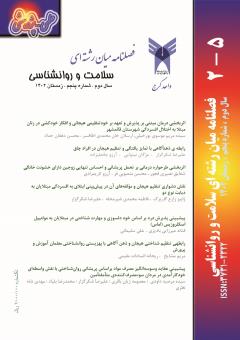نقش دشواری تنظیم هیجان و مؤلفههای آن در پیشبینی ابتلای به افسردگی مبتلایان به دیابت نوع دو. (نویسندگان : ژابیز زارع کاریزک / فاطمه محمدی شیرمحله / علیرضا شکرگزار)
محورهای موضوعی : تنظیم هیجان
1 - استادیار-عضوهیئت علمی دانشگاه آزاد اسلامی واحد کرج
کلید واژه: افسردگی, دشواری تنظیم هیجان, دیابت نوع دوم,
چکیده مقاله :
چکیده این پژوهش با هدف پیشبینی افسردگی براساس دشواری در تنظیم هیجان و مؤلفههای آن در افراد مبتلا به دیابت نوع دو انجام شد. پژوهش توصیفی-مقطعی و از نوع همبستگی بود. تمامی مبتلایان به دیابت نوع دوم مراجعهکننده به کلینیک دیابت ارمغان شهر کرج در سال 1401 به تعداد 218 نفر جامعه آماری پژوهش را تشکیل دادند، که با روش نمونهگیری در دسترس تعداد 200 نفر به عنوان نمونه انتخاب و به ابزارهای پژوهش شامل پرسشنامه تجدیدنظر شده افسردگی و پرسشنامه دشواری تنظیم هیجان پاسخ دادند. تحلیل دادهها در دو سطح آمار توصیفی و آزمون ضریب همبستگی و رگرسیون چندگانه با SPSS-v26 انجام شد. یافتهها نشان داد که بین دشواری تنظیم هیجان با ابتلای به افسردگی همبستگی مثبت و معناداری وجود دارد (545/0=r و 002/0>P). همچنین، تحلیل رگرسیون نشان داد در بین مؤلفههای دشواری تنظیم هیجان به ترتیب بالاترین توان تبیین ابتلای به افسردگی در بیماران دیابتی مربوط به عدم پذیرش پاسخهای هیجانی (05/0P< و 209/0=β) و پایینترین توان تبیین مربوط به دشواری در بکارگیری رفتارهای هدفمند (05/0P< و 060/0=β) بوده است. براساس یافتههای پژوهش در مراکز درمانی برای افزایش سلامت عمومی مبتلایان به دیابت توجه به پیشایندهای افسردگی و بهبود تنظیم هیجان ضروری است.
Abstract This research was conducted with the aim of predicting depression based on the difficulty in regulating emotions and its components in people with type 2 diabetes. The research was descriptive-cross-sectional and correlational. All patients with type 2 diabetes referred to Armaghan diabetes clinic in Karaj city in 2011, numbering 218 people, formed the statistical population of the study, which was selected using the available sampling method and 200 people were selected as a sample and the research tools included a questionnaire. Revised depression and emotion regulation difficulty questionnaire answered. Data analysis was done at two levels of descriptive statistics and correlation coefficient test and multiple regression with SPSS-v26. The findings showed that there is a positive and significant correlation between the difficulty of emotion regulation and suffering from depression (r=0.545 and P<0.002). Also, the regression analysis showed that among the components of emotion regulation difficulty, respectively, the highest explanatory power of depression in diabetic patients is related to the non-acceptance of emotional responses (P<0.05 and β=0.209) and the lowest explanatory power is related to It was difficult to use targeted behaviors (P<0.05 and β=0.060). Based on the research findings in medical centers, it is necessary to pay attention to the antecedents of depression and improve emotional regulation to increase the general health of people with diabetes.


